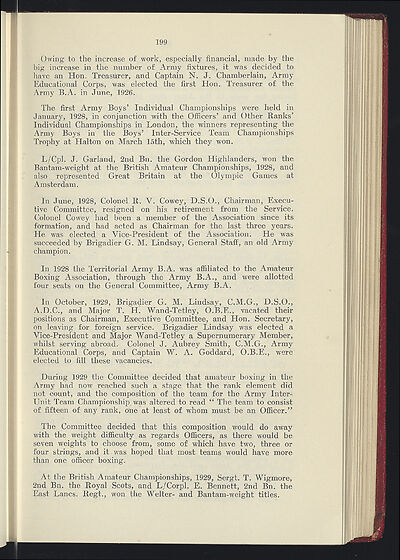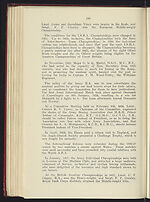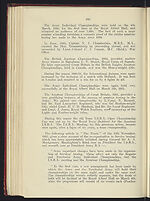1931
(211)
Download files
Complete book:
Individual page:
Thumbnail gallery: Grid view | List view

199
Owing to the increase of work, especially financial, made by the
big increase in the number of Army fixtures, it was decided to
have an Hon. Treasurer, and Captain N. J. Chamberlain, Army
Educational Corps, was elected the first Hon. Treasurer of the
Army B.A. in June, 1926.
The first Army Boys' Individual Championships were held in
January, 1928, in conjunction with the Officers' and Other Ranks'
Individual Championships in London, the winners representing the
Army Boys in the Boys' Inter-Service Team Championships
Trophy at Halton on March 15th, which they won.
L/Cpl. J. Garland, 2nd Bn. the Gordon Highlanders, won the
Bantam-weight at the British Amateur Championships, 1928, and
also represented Great Britain at the Olympic Games at
Amsterdam.
In June, 1928, Colonel R. V. Cowey; D.S.O., Chairman, Execu-
tive Committee, resigned on his retirement from the Service.
Colonel Cowey had been a member of the Association since its
formation, and had acted as Chairman for the. last three years.
He was elected a Vice-President of the Association. He was
succeeded by Brigadier G. M. Lindsay, General Staff, an old Army
champion.
In 1928 the Territorial Army B.A. was affiliated to the Amateur
Boxing Association, through the Army B.A., and were allotted
four seats on the General Committee, Army B.A.
In October, 1929, Brigadier G. M. Lindsay, C.M.G., D.S.O.,
A.D.C., and Major T. H. Wand-Tetley, O.B.E., vacated their
positions as Chairman, Executive Committee, and Hon. Secretary,
on leaving for foreign service. Brigadier Lindsay was elected a
Vice-President and Major Wand-Tetley a Supernumerary Member,
whilst serving abroad. Colonel J. Aubrey Smith, C.M.G., Army
Educational Corps, and Captain W. A. Goddard, O.B.E., were
elected to fill these vacancies.
During 1929 the Committee decided that amateur boxing in the
Army had now reached such a stage that the rank element did
not count, and the composition of the team for the Army Inter-
Unit Team Championship was altered to read " The team to consist
of fifteen of any rank, one at least of whom must be an Officer."
The Committee decided that this composition would do away
with the weight difficulty as regards Officers, as there would be
seven weights to choose from, some of which have two, three or
four strings, and it was hoped that most teams would have more
than one officer boxing.
At the British Amateur Championships, 1929, Sergt. T. Wigmore,
2nd Bn. the Royal Scots, and L/Corpl. E. Bennett, 2nd Bn. the
East Lancs. Regt., won the Welter- and Bantam-weight titles.
Owing to the increase of work, especially financial, made by the
big increase in the number of Army fixtures, it was decided to
have an Hon. Treasurer, and Captain N. J. Chamberlain, Army
Educational Corps, was elected the first Hon. Treasurer of the
Army B.A. in June, 1926.
The first Army Boys' Individual Championships were held in
January, 1928, in conjunction with the Officers' and Other Ranks'
Individual Championships in London, the winners representing the
Army Boys in the Boys' Inter-Service Team Championships
Trophy at Halton on March 15th, which they won.
L/Cpl. J. Garland, 2nd Bn. the Gordon Highlanders, won the
Bantam-weight at the British Amateur Championships, 1928, and
also represented Great Britain at the Olympic Games at
Amsterdam.
In June, 1928, Colonel R. V. Cowey; D.S.O., Chairman, Execu-
tive Committee, resigned on his retirement from the Service.
Colonel Cowey had been a member of the Association since its
formation, and had acted as Chairman for the. last three years.
He was elected a Vice-President of the Association. He was
succeeded by Brigadier G. M. Lindsay, General Staff, an old Army
champion.
In 1928 the Territorial Army B.A. was affiliated to the Amateur
Boxing Association, through the Army B.A., and were allotted
four seats on the General Committee, Army B.A.
In October, 1929, Brigadier G. M. Lindsay, C.M.G., D.S.O.,
A.D.C., and Major T. H. Wand-Tetley, O.B.E., vacated their
positions as Chairman, Executive Committee, and Hon. Secretary,
on leaving for foreign service. Brigadier Lindsay was elected a
Vice-President and Major Wand-Tetley a Supernumerary Member,
whilst serving abroad. Colonel J. Aubrey Smith, C.M.G., Army
Educational Corps, and Captain W. A. Goddard, O.B.E., were
elected to fill these vacancies.
During 1929 the Committee decided that amateur boxing in the
Army had now reached such a stage that the rank element did
not count, and the composition of the team for the Army Inter-
Unit Team Championship was altered to read " The team to consist
of fifteen of any rank, one at least of whom must be an Officer."
The Committee decided that this composition would do away
with the weight difficulty as regards Officers, as there would be
seven weights to choose from, some of which have two, three or
four strings, and it was hoped that most teams would have more
than one officer boxing.
At the British Amateur Championships, 1929, Sergt. T. Wigmore,
2nd Bn. the Royal Scots, and L/Corpl. E. Bennett, 2nd Bn. the
East Lancs. Regt., won the Welter- and Bantam-weight titles.
Set display mode to:
![]() Universal Viewer |
Universal Viewer | ![]() Mirador |
Large image | Transcription
Mirador |
Large image | Transcription
| Games and sports in the army > 1931 > (211) |
|---|
| Permanent URL | https://digital.nls.uk/248674118 |
|---|
| Description | 'Games and Sports in the Army' was an annual publication produced by the British War Office between the 1930s and 1960s. This included the Second World War. It outlines the rules and regulations for games and sports played by members of the armed forces. It features names and photographs of team members, and examples of contemporary advertising. |
|---|---|
| Shelfmark | GWB.52 |

